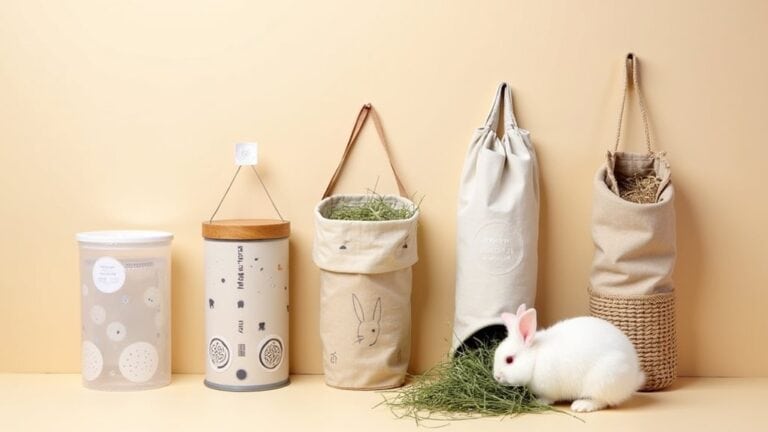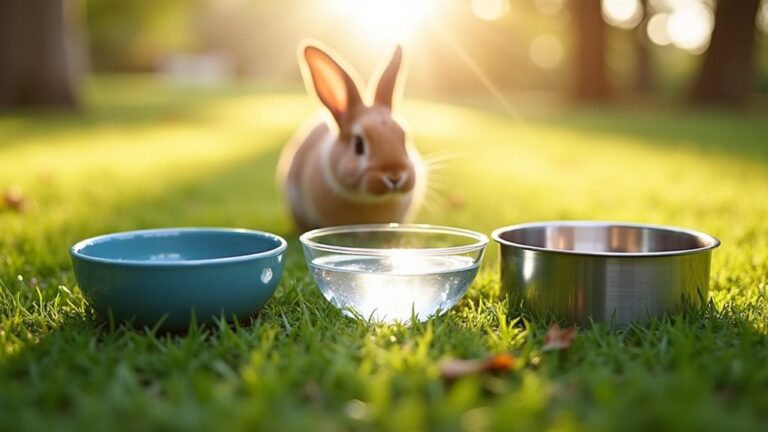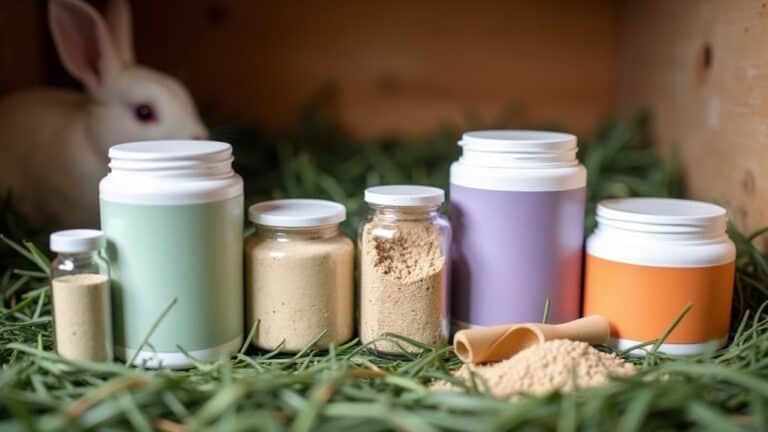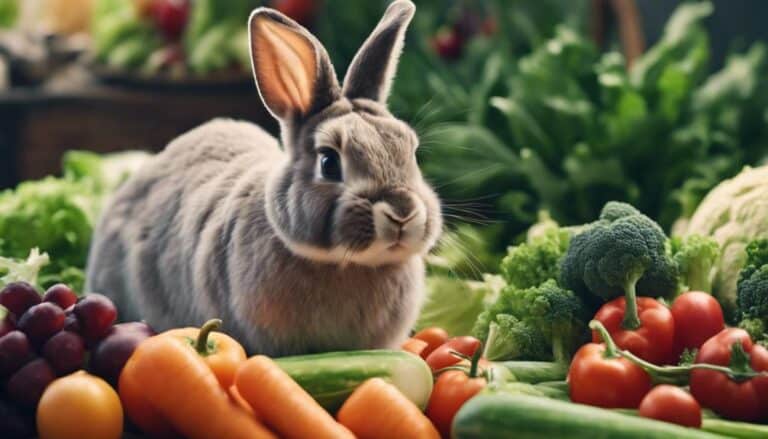You know that keeping your rabbit hydrated is essential for their overall health, but have you considered just how much water they actually need? Understanding the role of hydration in digestion, kidney function, and even temperature control can make a significant difference in your pet's well-being. It's not just about providing water; it's about ensuring your bunny thrives. As you explore the signs of dehydration and effective hydration strategies, you might uncover some surprising facts that could change how you care for your furry friend.
Contents
Importance of Water for Rabbits
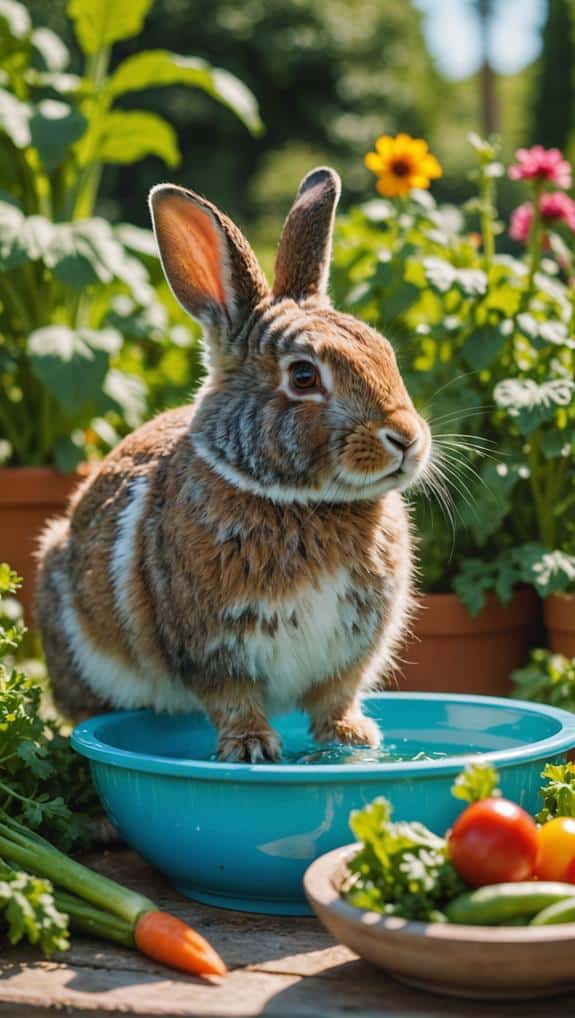
When you consider your rabbit's health, water often takes a backseat, but it plays a fundamental role in their overall well-being. Proper hydration is important for maintaining healthy blood circulation, organ function, and gut mobility, helping to prevent blockages.
Water is also key for calcium regulation, as it helps to flush out excess calcium through urine, reducing the risk of urinary issues. Rabbits need approximately 50-100 mL of water per kg of body weight daily to stay healthy daily water requirement.
Fresh water helps flush excess calcium, reducing the risk of urinary issues, such as bladder sludge or stones. Dehydration in rabbits can lead to serious complications, including gastrointestinal stasis, which can be life-threatening if untreated. It's critical to monitor your rabbit's water intake closely.
Watch for signs of illness related to dehydration, such as minimal or dark brown urine, reduced appetite, lethargy, and fewer droppings. If you notice these symptoms, it's important to seek veterinary attention immediately.
Alongside a balanced diet rich in hay and fresh vegetables, providing sufficient water is a foundational aspect of keeping your rabbit healthy and happy. Prioritizing hydration guarantees your furry friend thrives and minimizes the risk of severe health issues down the line. Regularly checking and refreshing your rabbit’s water supply is essential, as stale water can deter them from drinking enough. Some pet owners find that using a water bottle or a heavy ceramic bowl can encourage consistent hydration. To ensure optimal health, familiarize yourself with the best hydration techniques for rabbits, which can help keep your pet hydrated and energetic.
Water and Rabbit Digestion
Maintaining proper hydration is essential for your rabbit's digestive health. Water plays a fundamental role in ensuring that their food remains moist within the digestive tract, facilitating smooth digestion and transit through the gut. When rabbits don't drink enough water, insufficient hydration can lead to dry food that causes gastrointestinal problems. This increases the risk of developing Gastrointestinal Stasis, a life-threatening condition that can arise from digestive blockages.
Additionally, rabbits' natural grazing behavior emphasizes the importance of hydration in their overall digestive process, as it supports their high-fiber diet a balanced diet. Furthermore, dehydration greatly raises the likelihood of severe blockages, as the body starts drawing water from the bloodstream to compensate. This can create critical health risks for your rabbit, making it important to monitor their water intake closely.
To promote healthy rabbit digestion, always offer fresh water consistently. Encouraging your rabbit to drink regularly helps maintain effective digestion and can prevent serious health issues.
Water's Role in Kidney Function

Ensuring your rabbit stays well-hydrated is essential for ideal kidney function. Fresh water isn't just a thirst quencher; it plays a significant role in maintaining your rabbit's overall health, particularly when it comes to managing calcium levels.
Rabbits absorb all dietary calcium, and without adequate hydration, excess calcium can accumulate, leading to painful urinary issues like bladder sludge or stones. Observing your rabbit's drinking habits is important; decreased water intake can be a sign of underlying health problems that may require attention, such as dental issues or discomfort.
When your rabbit drinks enough water, it helps flush out this excess calcium, greatly reducing the risk of urinary tract diseases. You might notice pebbles in your rabbit's urine, signaling dehydration or potential kidney problems. This is a clear indication that you need to reassess your rabbit's hydration levels.
Regular access to water is crucial; a lack of it can lead to severe health complications, including kidney failure. By keeping your rabbit hydrated, you're not only preventing urinary stones but also promoting healthy kidney function.
Temperature Regulation Through Water Intake
Hydration is critical for your rabbit's ability to regulate body temperature, especially during hot weather. When temperatures rise, rabbits can drink up to four times more water than food, emphasizing the need for adequate hydration. Fresh, clean drinking water is fundamental to prevent dehydration, which can hinder their temperature regulation and lead to heat stress.
On hot days, guarantee your rabbit has access to water in shaded areas to help them stay cool. This is particularly important during peak daytime temperatures.
Sufficient hydration not only helps with temperature regulation but also supports urinary health by flushing out excess calcium, preventing potential kidney issues that can arise during heat.
You should monitor your rabbit's water intake closely, especially in warmer months. Keep an eye out for any signs of dehydration, such as lethargy and dark urine, as these can escalate quickly and pose serious health risks.
Additionally, incorporating fresh leafy greens into their diet can boost hydration levels on a daily basis.
Signs of Dehydration in Rabbits
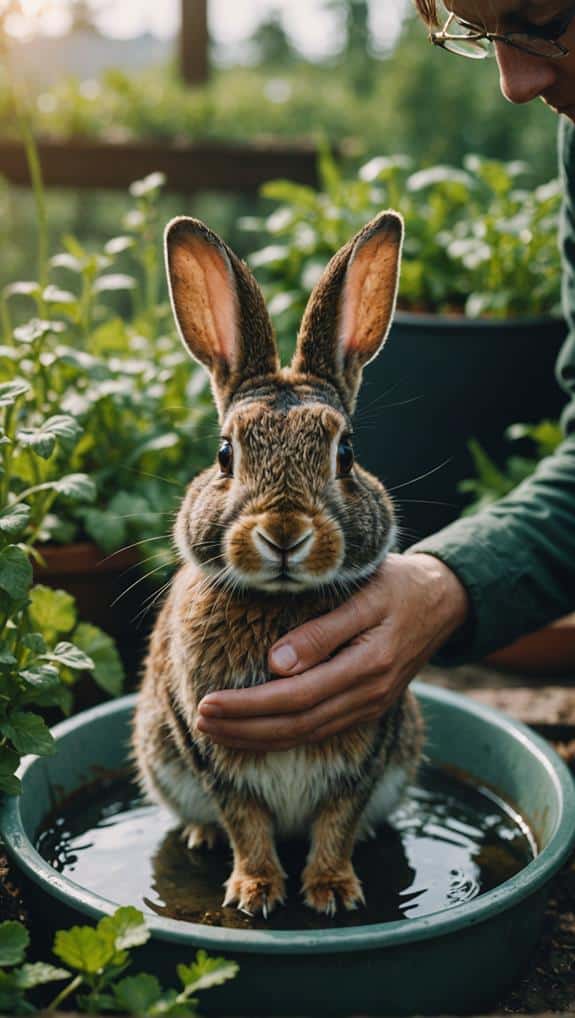
Recognizing the signs of dehydration in rabbits is crucial for their health, especially after discussing the role of water in temperature regulation.
One of the most telling signs is a noticeable decrease in droppings. If you observe few or no droppings, it likely indicates that proper hydration levels aren't being maintained. Additionally, pay attention to your rabbit's urine; dark, brownish urine can signal concentrated urine due to insufficient water intake.
A lack of appetite is another significant sign. Dehydrated rabbits often lose interest in food, which can further exacerbate their condition. You might also notice lethargy or reduced energy levels, as dehydration impacts their overall well-being. If your rabbit appears excessively tired or unresponsive, it's crucial to act quickly.
In severe cases, dehydration can manifest as extreme lethargy or dry gums, necessitating immediate veterinary assistance. Prompt action can prevent serious health complications.
Hydration Tips for Rabbit Owners
To keep your rabbit well-hydrated, it's vital to provide fresh, clean water every day. Rabbits require about 50-100 mL of water per kg of body weight to maintain proper hydration and prevent serious health issues.
Offering both a water bowl and a water bottle can cater to your rabbit's preferences, ensuring they've options readily available. Place these containers away from litter boxes and food areas to promote cleanliness and encourage drinking.
Regularly clean the water containers to avoid bacteria buildup, and refill them daily to keep the water fresh and appealing. If your rabbit seems less inclined to drink, try adding small amounts of unsweetened fruit juice or fresh herbs, like mint, to entice them.
It's essential to monitor your rabbit's hydration levels. Observe the color of their urine; concentrated urine can indicate dehydration. Additionally, keep track of their weight, as weight loss is another warning sign.
Final Thoughts
Just like a well-tended garden flourishes with regular watering, your rabbit thrives on proper hydration. Remember, rabbits need about 50-100 mL of water per kg of body weight each day. If you notice your furry friend becoming lethargic or their urine color darkening, it's a sign they might be wilting from dehydration. By ensuring fresh, clean water is always available, you're nurturing their health and happiness, helping them hop through life with energy and joy.

